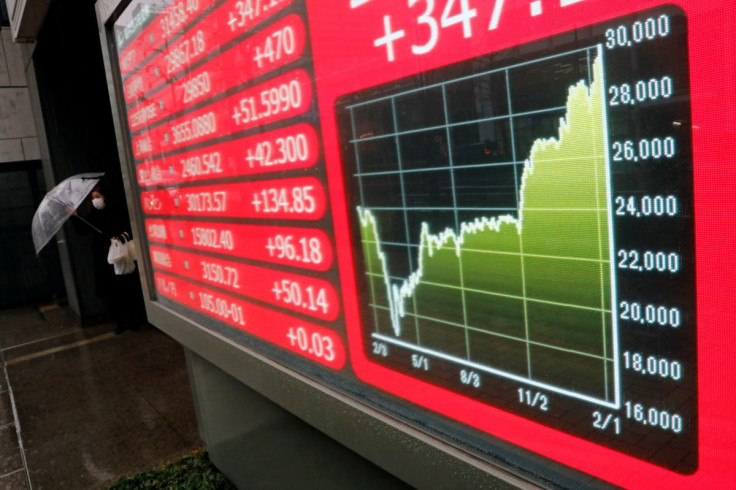Shares Waver As Sentiment Ebbs On Rate Fears, Yields Rise

U.S. and European stocks slid on Wednesday as the outlook for rate hikes sullied sentiment, while bond yields rose after euro-zone gross domestic product beat expectations, adding to bets of a more hawkish European Central Bank.
Trading was choppy as investors awaited the ECB meeting on Thursday and U.S. consumer price data on Friday that will highlight the dilemma investors face as they juggle how much central banks tighten policy and its impact on inflation.
The White House said it expected the headline inflation number on Friday to be "elevated." Economists expect annual inflation to be 8.3%, according to a Reuters poll.
Investors are worried about the economic outlook and its effect on results. Citi Research analysts cautioned that Intel Corp could pre-announce weaker-than-expected earnings for the second quarter. Intel's shares fell 4.1%.
Target had roiled markets on Tuesday when the retailer cut its profit margin forecast after reporting a much steeper drop in quarterly profit in May than expected. Other companies will follow and challenge second-quarter results, said Philip Orlando, chief equity market strategist at Federated Hermes.
"The market is rolling over here and will at a minimum retest that 3,800 level that we saw in early May over the course of the next couple of months, and it may go a little bit below that," he said. He called the recent rally a dead-cat bounce.
The S&P 500 almost confirmed a bear market when it slid more than 20% from its record closing peak on Jan. 3 to an intraday low of 3,810.32 on May 20, but the benchmark closed higher.
The pan-European STOXX 600 index closed down 0.57% as concerns about growth weighed on banking shares, while MSCI's gauge of stocks across the globe shed 0.64%.
On Wall Street, the Dow Jones Industrial Average fell 0.91%, the S&P 500 lost 1.11% and the Nasdaq Composite dropped 0.74%.
Data showed the euro zone economy grew much faster in this year's first quarter than the previous three months, despite the war in Ukraine, the European Union statistics office said, as it revised earlier estimates sharply higher.
Investors raised their bets on ECB rate hikes, and money markets priced in 75 basis points of rate hikes by September.
German and U.S. Treasury yields rose after the euro area GDP data beat expectations, adding to bets of a more hawkish ECB.
The yield on 10-year Treasury notes was up 6.1 basis points to 3.031%.
Germany's 10-year yield, the benchmark for the euro area, rose to a new high since 2014 at 1.368%.
The Organization for Economic Cooperation and Development slashed its growth outlook to 3% this year from 4.5% forecast in December. The OECD also raised its inflation estimates, though it said there was a limited risk of "stagflation."
The euro hit a seven-year peak against the yen, getting a lift from the upward revision to first quarter growth. Against the dollar, the euro was up 0.15% to $1.0715.
The dollar index rose 0.107% and managed to hit a fresh 20-year high against the yen. The yen weakened to hit 134.47 per dollar, its softest since Feb. 27, 2002.
Asian stocks strengthened overnight, with Chinese stocks seeing some relief from easing of COVID-19 restrictions, but sentiment was volatile and European indexes fell soon after opening.
Japan's economy shrank slightly less than initially reported in the first quarter, as private consumption remained resilient and companies rebuilt inventories.
Oil prices rose about 1% as U.S. crude hit a 13-week high despite a rise in domestic crude inventories, as supplies looked likely to tighten with China easing lockdowns and Norwegian oil workers planning to strike.
U.S. crude futures rose $2.70 to settle at $122.11 a barrel and Brent settled up $3.01 to $123.58 a barrel.
Gold inched up in choppy trade as concerns over economic growth boosted the metal's safe-haven appeal.
U.S. gold futures settled up 0.2% at $1,856.50.
Bitcoin fell 2.94% to $30,200.98.
© Copyright Thomson Reuters 2024. All rights reserved.




















